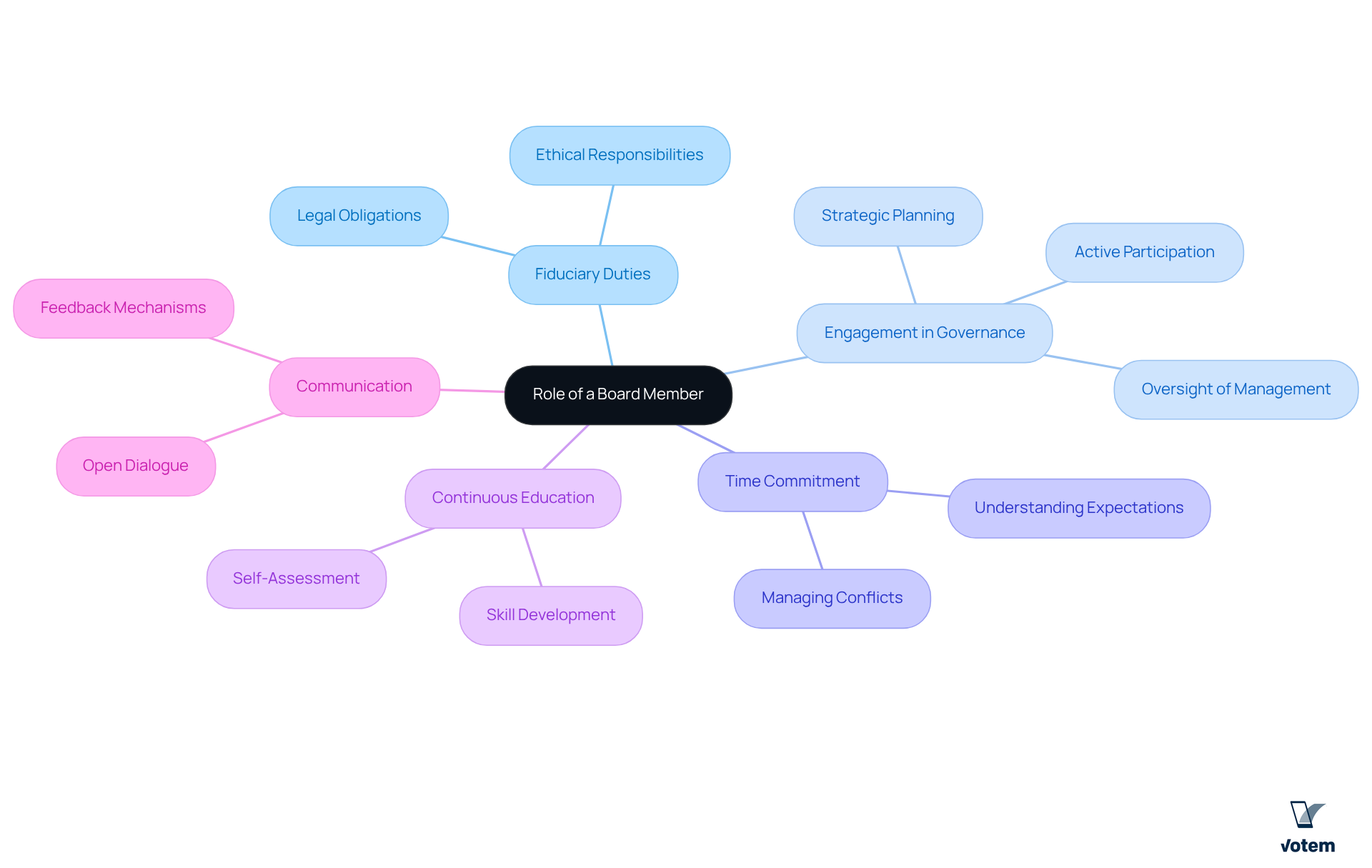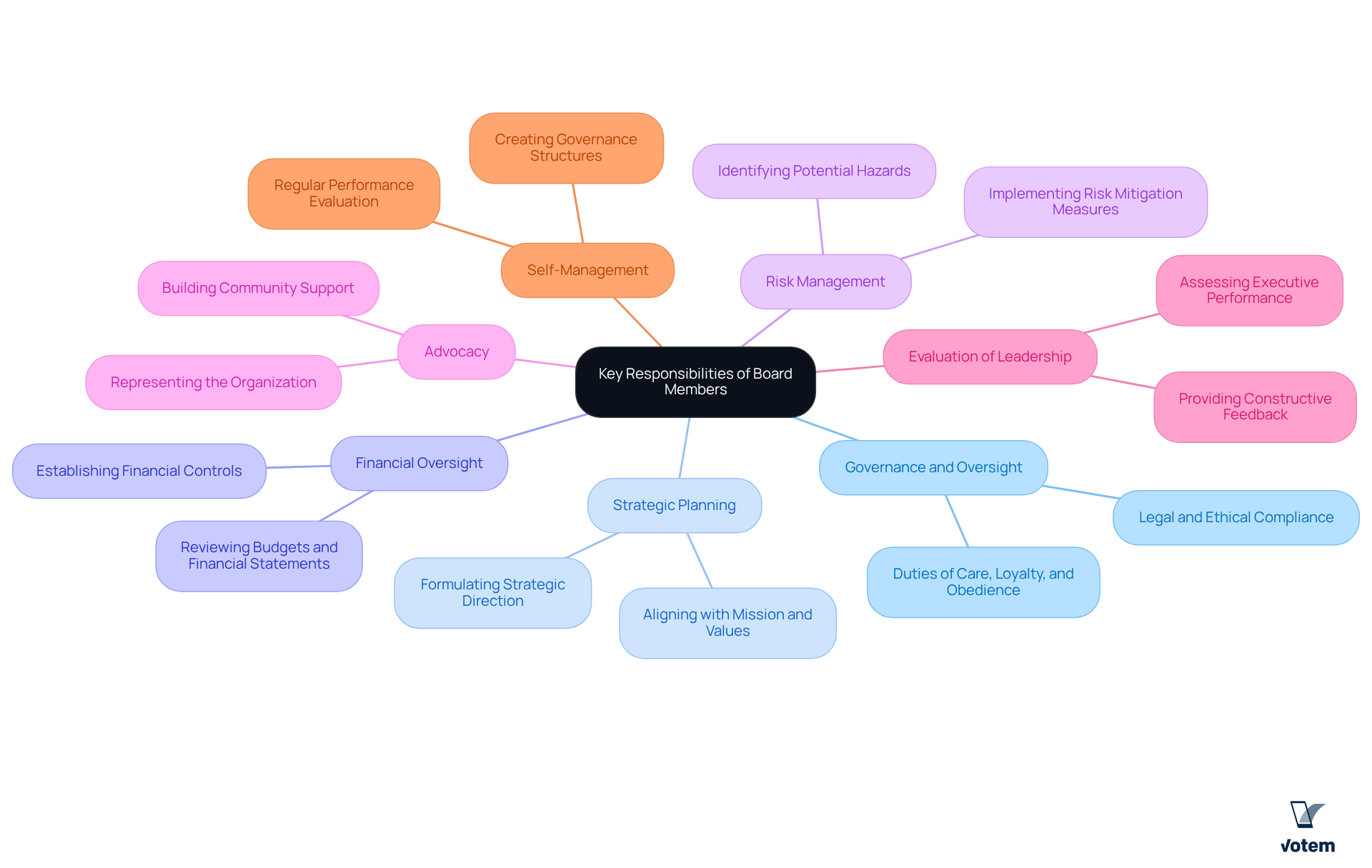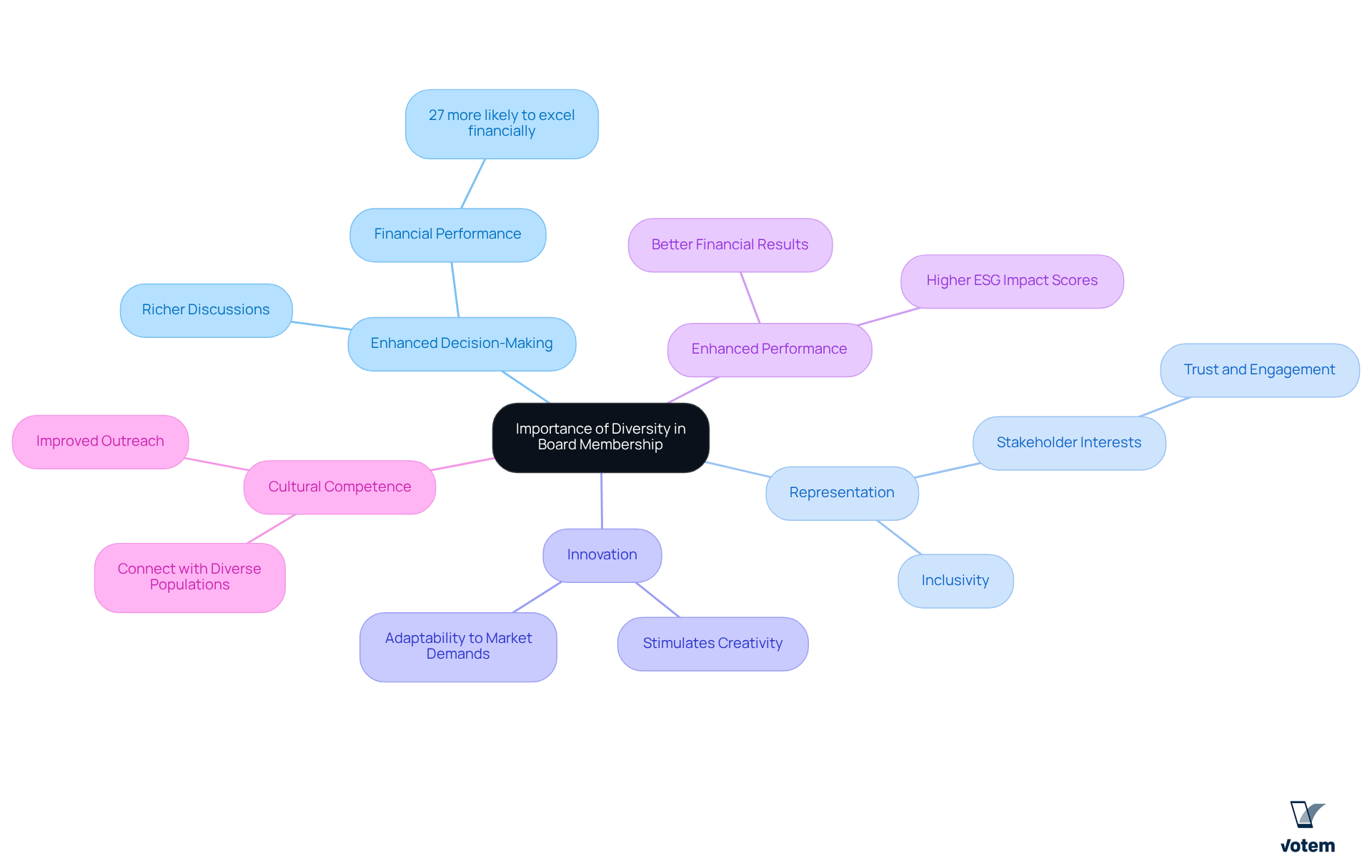Overview
Being a board member entails the fulfillment of key roles, including governance, strategic planning, financial oversight, and risk management. These responsibilities must be approached with a commitment to legal and ethical obligations towards the organization and its stakeholders. Effective board members engage actively in these essential duties, prioritizing diversity as a means to enhance decision-making and drive organizational success. Ultimately, this dedication ensures that the entity’s mission is met and its integrity is upheld.
Furthermore, the active participation of board members in these roles is crucial. It not only fosters a culture of accountability but also cultivates a diverse environment that enriches discussions and outcomes. By embracing these principles, board members can significantly contribute to the overall effectiveness of the organization, ensuring that it remains aligned with its goals and values.
In addition, the commitment to diversity within the boardroom is not merely a compliance issue; it is a strategic advantage. A diverse board brings varied perspectives and experiences, which are invaluable in navigating the complexities of today’s business landscape. This approach not only enhances decision-making but also strengthens stakeholder trust and engagement.
In conclusion, the role of a board member is both impactful and essential. By fulfilling these responsibilities with diligence and a focus on diversity, board members can ensure that their organizations thrive and maintain their integrity in an ever-evolving environment.
Introduction
In today’s complex organizational landscape, understanding the intricate role of a board member is essential—whether in corporations, nonprofits, or governmental entities. Board members are not merely figureheads; they play a pivotal role in steering their organizations’ direction, ensuring compliance with legal and ethical standards, and advocating for the mission at hand. This raises a critical question: what does it truly mean to be a board member in an era where accountability and effective governance are paramount?
This article explores the multifaceted responsibilities and obligations of board members, highlighting the critical importance of diversity within board membership. By illuminating the path for those considering this influential role, we aim to inspire action and foster a deeper understanding of what it takes to lead effectively.
Defining the Role of a Board Member
A board representative is an individual appointed to serve on the board of directors of a company, which leads to the question of what does it mean to be a board member, whether it be a corporation, nonprofit, or governmental entity. This governing body is charged with overseeing the entity’s activities, ensuring adherence to its mission, and making strategic decisions that shape its future. Understanding what it means to be a board member includes recognizing their role as fiduciaries with a legal and ethical obligation to prioritize the best interests of the entity and its stakeholders. Their responsibilities extend beyond ceremonial duties; they require active engagement in governance, strategic planning, and oversight of management practices, highlighting what does it mean to be a board member.
In 2025, the importance of efficient governance in nonprofits is underscored by the fact that organizations with engaged board members report higher levels of accountability and transparency. Understanding what it means to be a board member highlights that time commitment emerges as a crucial factor, as misunderstandings regarding time expectations can lead to inadequate participation. Expert insights reveal that understanding what does it mean to be a board member necessitates not only a thorough understanding of the entity’s vision and challenges but also a commitment to continuous education and self-assessment. As Steve Zabilski notes, understanding what does it mean to be a board member is the common denominator for successful nonprofits and an effective group of directors. A well-functioning board is vital for navigating the complexities of today’s political and economic landscape, highlighting what does it mean to be a board member in ensuring that organizations remain robust and responsive to community needs.
Furthermore, initiating open dialogue with the nonprofit from the outset is essential for prospective board members to communicate their time constraints and comprehend the dynamics of the existing board structure.

Key Responsibilities and Duties of Board Members
Board members hold several essential responsibilities that are crucial for the effective governance of their organizations:
-
Governance and Oversight: Board members ensure that the entity operates within legal and ethical boundaries while fulfilling its mission. This includes adhering to the duties of care, loyalty, and obedience, which are fundamental to maintaining legal and ethical standards.
-
Strategic Planning: Actively engaging in formulating and endorsing the entity’s strategic direction and objectives is vital. This entails aligning the strategic plan with the entity’s mission and values, confirming that all initiatives support long-term objectives.
-
Financial Oversight: Board members are responsible for reviewing and approving budgets and financial statements, ensuring the entity remains financially stable. This encompasses overseeing financial performance, establishing appropriate financial controls to protect the entity’s resources, and obtaining sufficient resources to achieve the entity’s mission.
-
Risk Management: Identifying potential hazards to the entity is a key duty. Board directors must ensure that suitable measures are in place to reduce these risks, promoting a culture of proactive risk management that integrates into the entity’s operations.
-
Advocacy: Acting as representatives for the entity, board members advance its mission and values to the community and stakeholders. This role is essential for generating support, improving the entity’s public image, and maintaining community involvement.
-
Evaluation of Leadership: Assessing the performance of the executive director or CEO is crucial, as it provides support and guidance as needed. This assessment procedure promotes effective leadership and accountability within the entity, highlighting the significance of constructive feedback and growth.
-
Self-Management: Boards must also focus on self-management, creating structures, policies, and procedures that support good governance. This includes regularly evaluating their own performance and ensuring that they operate effectively as a governing body.
By fulfilling these responsibilities, board participants not only contribute to the organization’s success but also enhance its credibility and effectiveness in the community.

Legal and Ethical Obligations of Board Members
Board members are bound by three primary legal duties that are essential for effective governance and organizational integrity.
-
Duty of Care: Board members must make informed decisions, exercising the care that a reasonably prudent person would in a similar position. This duty entails being prepared for meetings and fully understanding the entity’s operations. Expert opinions underscore that effective board processes empower directors to meet their fiduciary responsibilities and comply with regulatory expectations. Furthermore, 46% of leaders identify the evolving regulatory landscape as a significant threat, highlighting the critical nature of the duty of care in navigating complex environments.
-
Duty of Loyalty: Members are required to act in the best interests of the entity, steering clear of conflicts of interest and self-dealing. They must prioritize the entity’s welfare above personal gain. Common violations include failing to disclose conflicts of interest, such as hiring a firm owned by an official without proper bidding or consultation. The Delaware Court of Chancery stresses that directors must exhibit loyalty to avoid legal scrutiny, particularly under the entire fairness doctrine, which applies when directors lack independence or act without good faith.
-
Duty of Obedience: Board participants must ensure compliance with applicable laws and regulations, while also adhering to the entity’s mission and bylaws. Ethical responsibilities demand that council members act with integrity, transparency, and accountability, fostering trust among stakeholders. Recent data indicates that 74% of entities view compliance as a burden, emphasizing the challenges executives face in maintaining legal and ethical standards. Moreover, directors should recognize the importance of understanding and managing ESG risks, as highlighted by field experts.
In summary, the interplay of these duties shapes the governance landscape, compelling members of the governing body to navigate complex ethical responsibilities while ensuring compliance, which ultimately raises the question of what does it mean to be a board member and safeguarding the organization’s interests. Neglecting these obligations can result in significant legal repercussions and reputational harm, reinforcing the necessity for diligent oversight.
Importance of Diversity and Composition in Board Membership
Diversity in board membership is essential for several compelling reasons:
-
Enhanced Decision-Making: Boards composed of individuals from varied backgrounds, experiences, and perspectives lead to richer discussions and more informed decisions. Research indicates that firms in the top quartile for gender diversity among directors are 27% more likely to excel financially than those in the bottom quartile.
-
Representation: A diverse board is better positioned to represent the interests of a wider array of stakeholders, including employees, customers, and the community. This inclusivity promotes trust and engagement throughout the company.
-
Innovation: Different viewpoints stimulate creativity and innovation, enabling organizations to adapt effectively to evolving challenges and market demands. Varied groups are more likely to prioritize innovative solutions, enhancing overall organizational agility.
-
Enhanced Performance: Organizations with varied leadership teams often experience better financial results and governance outcomes. For instance, companies with greater diversity in leadership roles tend to achieve higher social and environmental impact scores, reflecting their commitment to comprehensive stakeholder interests.
-
Cultural Competence: A varied group enhances an organization’s ability to connect with and serve diverse populations, improving outreach and effectiveness. This cultural competence is increasingly vital in today’s globalized market, where understanding community needs is paramount.
In summary, the integration of diverse perspectives not only enriches board discussions but also drives better decision-making and organizational success.

Conclusion
Being a board member encompasses a multifaceted role that involves governance, strategic planning, and ethical oversight. It is essential for individuals in these positions to understand their responsibilities, which include:
- Ensuring the organization adheres to its mission
- Managing risks
- Promoting accountability
The significance of these roles cannot be overstated; they are foundational to the success and integrity of any organization, whether it be a nonprofit, corporation, or governmental entity.
Throughout the article, key responsibilities such as:
- Financial oversight
- Advocacy
- Evaluation of leadership
have been highlighted. Board members must navigate legal and ethical obligations, including the duties of care, loyalty, and obedience, which are critical for maintaining organizational integrity. Furthermore, the importance of diversity within board membership emerges as a vital factor, enhancing decision-making and fostering innovation while better representing the interests of all stakeholders involved.
Ultimately, the effectiveness of a board is determined by its members’ commitment to their roles and their ability to work collaboratively towards a common goal. By embracing their responsibilities and prioritizing diversity, board members can significantly impact their organizations and the communities they serve. Engaging in continuous education and open dialogue will further enhance their effectiveness, ensuring that they remain responsive to the evolving challenges and needs of the entities they govern.
Frequently Asked Questions
What is the role of a board member?
A board member serves on the board of directors of a company, overseeing its activities, ensuring adherence to its mission, and making strategic decisions that shape its future.
What are the legal and ethical obligations of a board member?
Board members have fiduciary responsibilities, meaning they are legally and ethically obligated to prioritize the best interests of the entity and its stakeholders.
What responsibilities do board members have beyond ceremonial duties?
Board members are expected to engage actively in governance, strategic planning, and oversight of management practices.
Why is time commitment important for board members?
Time commitment is crucial because misunderstandings regarding time expectations can lead to inadequate participation and engagement in board activities.
How does the engagement of board members impact nonprofits?
Organizations with engaged board members report higher levels of accountability and transparency, which are essential for effective governance.
What should prospective board members do before joining a board?
Prospective board members should initiate open dialogue with the nonprofit to communicate their time constraints and understand the dynamics of the existing board structure.
Why is continuous education important for board members?
Continuous education and self-assessment are necessary for board members to thoroughly understand the entity’s vision and challenges, contributing to their effectiveness.
What is the significance of a well-functioning board in today’s environment?
A well-functioning board is vital for navigating the complexities of the political and economic landscape, ensuring that organizations remain robust and responsive to community needs.
List of Sources
- Defining the Role of a Board Member
- Ready to Be a Board Member? What Executives Should Know Before Saying, “Yes” | Virginia Piper (https://pipertrust.org/news/ready-to-be-a-board-member-what-executives-should-know-before-saying-yes)
- Nonprofit Board News, September 2025: AI Oversight a Must for Boards (https://onboardmeetings.com/blog/nonprofit-board-news-september-2025-ai-oversight-a-must-for-boards)
- In The News – BoardSource (https://boardsource.org/news/category/in-the-news)
- Nonprofit Boards in the News, August 2025: Policy, Funding Shifts Abound (https://onboardmeetings.com/blog/nonprofit-boards-in-the-news-august-2025-policy-funding-shifts-abound)
- The Board’s Role in Times of Crisis | Associations Now (https://associationsnow.com/2025/02/the-boards-role-in-times-of-crisis)
- Key Responsibilities and Duties of Board Members
- THE CORPORATE BOARD | The Leading Journal of Corporate Governance (https://corporateboard.com)
- Board Member Roles and Responsibilities | BoardSource (https://boardsource.org/fundamental-topics-of-nonprofit-board-service/roles-responsibilities)
- Nonprofit Board News, September 2025: AI Oversight a Must for Boards (https://onboardmeetings.com/blog/nonprofit-board-news-september-2025-ai-oversight-a-must-for-boards)
- Corporate Governance News | Today’s Latest Stories | Reuters (https://reuters.com/legal/corporate-governance)
- Board responsibilities: A practical guide for directors – The Corporate Governance Institute (https://thecorporategovernanceinstitute.com/insights/guides/board-responsibilities-a-practical-guide-for-directorss?srsltid=AfmBOornmHIK_oexje-P6iNqFJlVNydyA4fTHkuFjLcXM9-cmiruCChd)
- Legal and Ethical Obligations of Board Members
- 115 Compliance Statistics You Need To Know in 2023 – Drata (https://drata.com/blog/compliance-statistics)
- Directors’ duties: the US perspective (https://globalinvestigationsreview.com/guide/the-practitioners-guide-global-investigations/2025/article/directors-duties-the-us-perspective)
- The Ultimate List of Compliance Program Statistics (https://navexglobal.com/compliancenext/understanding-the-basics/the-ultimate-list-of-compliance-program-statistics)
- Board Member Legal Duties for Nonprofits (https://boardsource.org/resources/legal-duties-nonprofit-board-members)
- Importance of Diversity and Composition in Board Membership
- Importance of board diversity in modern governance | Aprio (https://aprioboardportal.com/news/board-diversity-importance)
- Board Diversity – The State of Play In 2025 – Compensia (https://compensia.com/board-diversity-the-state-of-play-in-2025)
- Diversity helps: Study shows more women on boards can improve how businesses are managed (https://phys.org/news/2025-03-diversity-women-boards-businesses.html)
- Diversity matters even more: The case for holistic impact (https://mckinsey.com/featured-insights/diversity-and-inclusion/diversity-matters-even-more-the-case-for-holistic-impact)
- Corporate Board News, September 2025: DEI Battles, Political Influence Increase (https://onboardmeetings.com/blog/corporate-board-news-september-2025-dei-battles-political-influence-increase)

